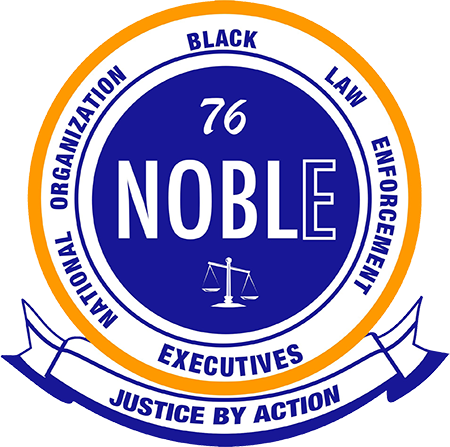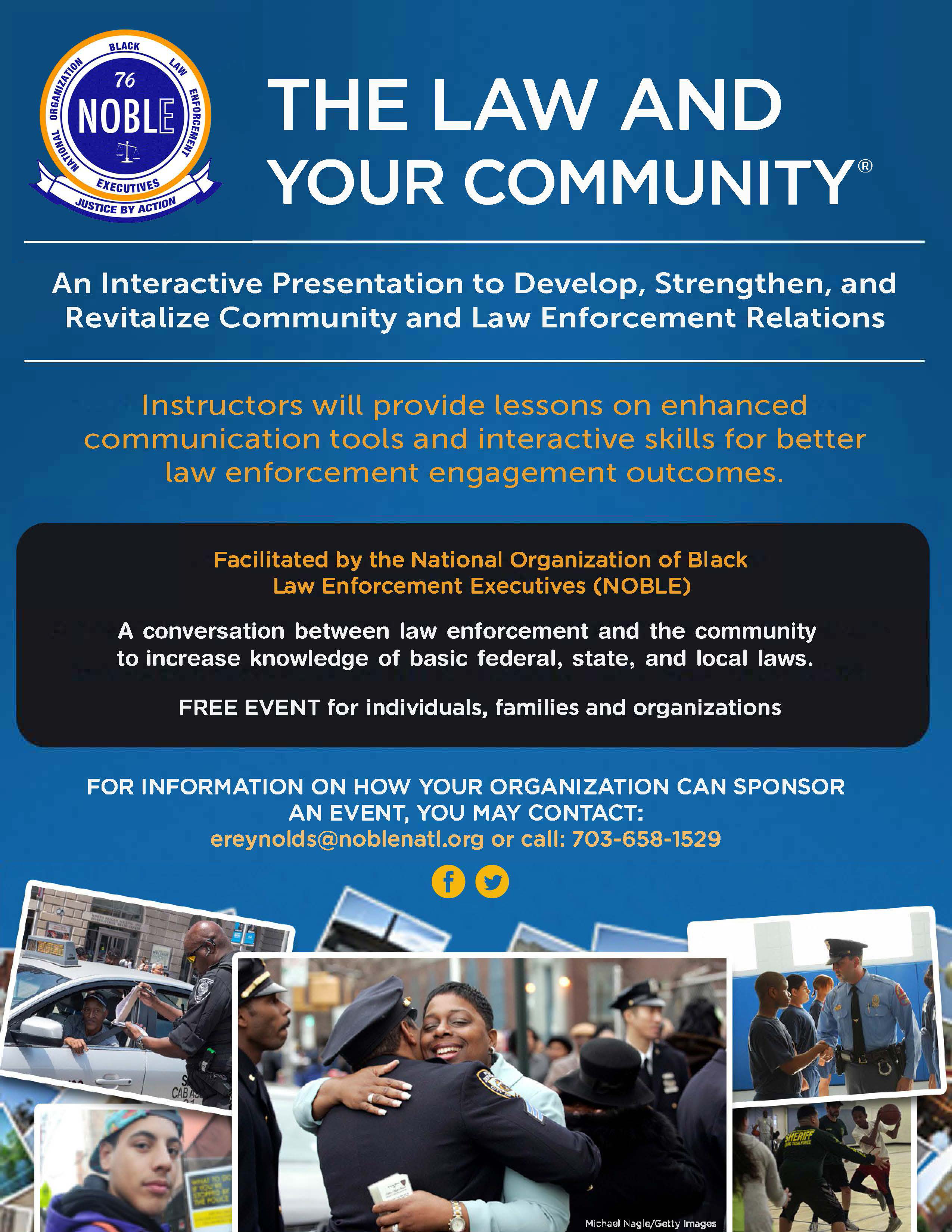Contact Us
To provide feedback on the Community Policing Dispatch, e-mail the editorial board at CPDispatch@usdoj.gov.
To obtain details on COPS Office programs, publications, and resources, contact the COPS Office Response Center at 800-421-6770 or AskCopsRC@usdoj.gov

U.S. Department of Justice
Office of Community Oriented Policing Services
Washington, DC 20530
 The evening news comes into our living rooms too often with stories of senseless deaths of community members or police officers. As the details for each event become public, we often ask, was there something that could have prevented that? Why did it have to end that way? Communities want to understand what makes a police officer use deadly force. Likewise, law enforcement agencies are looking for meaningful ways to improve their relationship with the communities they serve. The National Organization of Black Law Enforcement Executives (NOBLE) developed The Law and Your Community training program in 2014 and later revised and expanded the reach of the program with support from the Office of Community Oriented Policing Services (COPS Office). The program has reached over 50,000 youth in communities across the country and is widely viewed as an essential tool to building meaningful community-police relations.
The evening news comes into our living rooms too often with stories of senseless deaths of community members or police officers. As the details for each event become public, we often ask, was there something that could have prevented that? Why did it have to end that way? Communities want to understand what makes a police officer use deadly force. Likewise, law enforcement agencies are looking for meaningful ways to improve their relationship with the communities they serve. The National Organization of Black Law Enforcement Executives (NOBLE) developed The Law and Your Community training program in 2014 and later revised and expanded the reach of the program with support from the Office of Community Oriented Policing Services (COPS Office). The program has reached over 50,000 youth in communities across the country and is widely viewed as an essential tool to building meaningful community-police relations.
Whether you are a law enforcement agency, college or university, school district, nonprofit, or religious organization, chances are you are looking for ways to continue serving and improving your community. NOBLE, a professional association of over 3,500 men and women in law enforcement, is dedicated to improving community-police relations through meaningful public safety programs. The Law and Your Community is a successful community policing asset that we want to share with your community.
NOBLE partnered with the COPS Office to create a training that would bring police officers together to have a “conversation without confrontation.” We believe that the program is an asset because it is a nationally recognized hands-on interactive training program for young people designed to improve their communication with law enforcement officers and their understanding of federal, state, and local laws. The training also touches on components of citizenship, law literacy, and law enforcement engagement.
In the citizenship module, we provide education on how representative democracy works and the role that citizens play in the government. During the law literacy module, the goal is to increase participants’ knowledge regarding crimes that teens and young adults may lack knowledge of. The critical law enforcement engagement module educates participants on the best way to respond and react during encounters with law enforcement. How officers should treat you, how to treat the officer, and how to handle police mistreatment if it happens.
 The program brings community members and law enforcement together in a safe environment to help educate and bring awareness to one another. And the word is getting out there. Since January 2014, NOBLE has delivered The Law and Your Community in middle and high schools across the United States. The program is being taught in the Chicago area at 15 high schools on a weekly basis. In California the course is taught one hour each week for 12 weeks to at-risk males. NOBLE conducts The Law and Your Community in Florida in middle schools in high crime districts. NOBLE has also presented the training at almost all the middle and high schools in Delaware.
The program brings community members and law enforcement together in a safe environment to help educate and bring awareness to one another. And the word is getting out there. Since January 2014, NOBLE has delivered The Law and Your Community in middle and high schools across the United States. The program is being taught in the Chicago area at 15 high schools on a weekly basis. In California the course is taught one hour each week for 12 weeks to at-risk males. NOBLE conducts The Law and Your Community in Florida in middle schools in high crime districts. NOBLE has also presented the training at almost all the middle and high schools in Delaware.
A police chief in Pennsylvania thought so highly of the program that he had several of his officers take the training along with himself so that he could use the program to engage the community in all his police districts. When the chief relocated to a different state, he reached out to NOBLE so the officers and community in his new agency could benefit from the program. He told NOBLE, “The Law and Your Community is an outstanding community education initiative which facilitates open and transparent communication between police and community members. It is an important first step for police gaining an understanding of community perceptions and the community gaining an understanding of the challenges facing police.” Relationship-building through education is a key component to building trust with communities.
A survey completed with a focus group in New Jersey after participating in The Law and Your Community training events identified a few key themes that emerged from the groups:
- Youth who attend the program have a better understanding of why law enforcement does certain things and carry themselves in a certain manner.
- Youth learned what to do when interacting with the police in various situations, including in the street, car, and home.
- Youth gained knowledge about their rights, where to go for information about their rights, and how to handle and report police misconduct.
NOBLE has presented The Law and Your Community at several colleges across the country. Two such campuses that are very diverse in population are Gallaudet University in Washington, DC, which serves a deaf and hard-of-hearing student population, and to student athletes at Lane College in Jackson, Tennessee, a historically black college which serves predominately African American students. The Law and Your Community was especially powerful at these campuses, at which campus leadership asked NOBLE for the training to be done to meet a need in the campus community. Being asked to deliver the program at a historically black college gave NOBLE the opportunity to use The Law and Your Community as an officer recruitment tool and to sow seeds of interest in law enforcement careers. One student-athlete from Lane College who attended the program was very candid about his experience with the training: “My favorite part of the training was the traffic stop, because I learned some things that I did not know that could put me at risk or even get me killed.” He also stated that he now “gets it” that as a citizen, if you want to be respected you should be respectful.
If The Law and Your Community can help shape the attitude of one person from negative to positive and that change saves the life of an officer, then The Law and Your Community is a community-policing resource that every community can use. Contact NOBLE to help your agency facilitate open and transparent communication between your police officers and the communities you serve.
Dwayne A. Crawford
Executive Director, NOBLE
Subscribe to Email Updates
To sign up for monthly updates or to access your subscriber preferences, please enter your email address in the Subscribe box.






